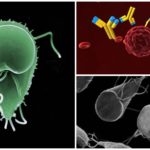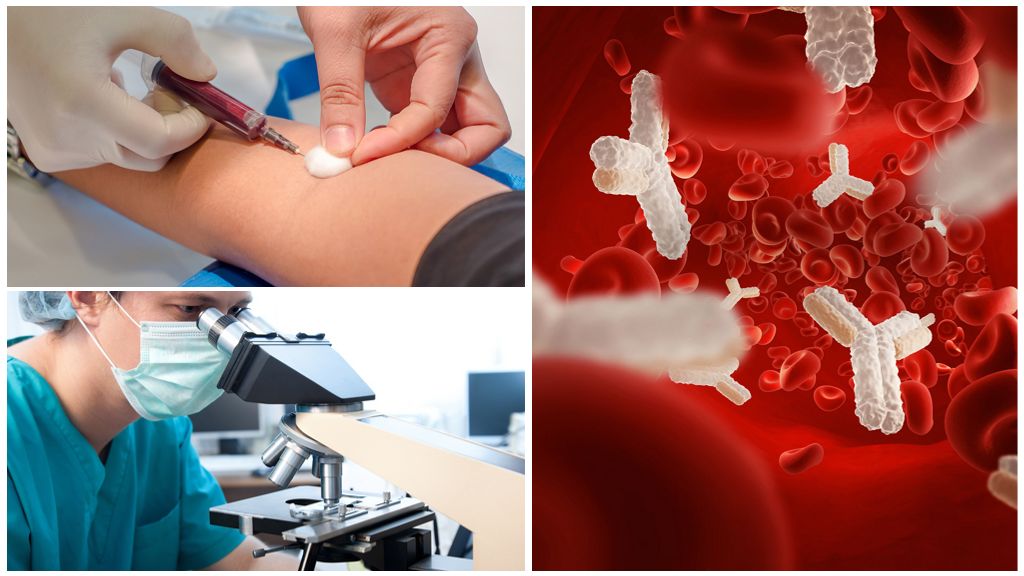Antibodies to lamblia, decoding indicators
Content
- Antibodies to Giardia
- Blood test for antibodies to Giardia
When infected with giardiasis, the human immunity begins to produce specific proteins - antibodies. They create protection against the parasite, they are normally absent in the blood. The analysis for antibodies to Giardia helps to recognize the disease and clarify the infection.
How the body reacts to the parasite
Infection with giardiasis occurs through the fecal-oral route. The pathogen enters the human digestive tract in the form of inactive cysts, passes into the trophozoid form and begins to multiply in the small intestine.
On a note!
Giardia can be in the body for a short time and leave it alone. In this case, talking about spontaneous healing. In case of defects, the process becomes chronic.
The simplest absorb nutrients throughout the cell area, releasing their toxins into the lumen. They cause:
- dysbiosis with abdominal pain, impaired stool;
- chronic allergic reactions;
- vitamin and mineral deficiency.
- biliary dyskinesia;
- intestinal inflammation;
- intoxication with headaches, general weakness, fainting;
- skin lesions with an allergic rash;
- impaired growth and development in children.
Parents of a sickly child with a tendency to inflammatory bowel lesions, allergies of a different nature, suffering from asthma, willingly go to any examinations to identify the cause of illness. The analysis for Giardia can be assigned as a screening to exclude infection.Normally in children, it will show a negative result.
How are antibodies to the parasite
Trophozoids (active forms) lamblia attach to the villi of the small intestine, causing the body’s immune response. It is necessary to clarify what it is. In the human body there are special cells responsible for its protection. The main role is played by T and B lymphocytes.
The function of B-lymphocytes is to develop special protein-antibodies. They enter the bloodstream, bind infectious antigens and in the form of immune complexes are removed from the body. In case of giardiasis, the definition of ig g and ig m is of primary importance.
In laboratory diagnostics, the definition of total iga igm igg to Giardia is widely used to identify the body's immune response to the introduction of the parasite. This method is highly sensitive with timely appointment.
On a note!
The formation of antibodies to lamblia antigens occurs after 1-2 weeks from the onset of the onset of symptoms. With the earlier direction of a person for a blood test, the probability of obtaining a false-negative result is high. That is why a preventive study without a clinic of the disease, “just in case” in 90% of cases will not help to identify the parasite.
According to statistics, attacks on lamblia are found in 40% of patients with symptoms such as diarrhea, allergic reactions, astheno-neurotic syndrome, and chronic intoxication. The detection method is attributed to additional analyzes. It has a high sensitivity, but can give false positive results in the formation of cross-antigens to other parasites or own cells of the human body.
Analysis of the determination of the antibody titer to the parasite allows you to track the duration of the disease. When giardiasis is infected, immunoglobulins of class M first appear in the blood. Their concentration begins to increase, indicating “fresh” contact with the parasite. Their content remains constant over several weeks and gradually decreases. Shortly after the primary response, B-lymphocytes begin to produce more specific ig g to this antigenic Giardia composition. The growth of their titer in the presence of ig m indicates a small duration of giardiasis.
Example: a positive igg with a lamblia result of 1 40 to a lamblia of 1 200 with the disappearance of ig m in the analysis will indicate a chronic (persistent) course.
Important!
During treatment, the concentration of antibodies will fall. After getting rid of the parasite, immunoglobulins are stored in the blood for several months.
Indications and preparation for research
If the infectious disease specialist recommends performing a blood test for antibodies to lamblii, he will explain where and how to make it and will clarify that some special preparation is not required for it:
- During the day before the delivery of the material should not change food habits, drink alcohol.
- 6-8 hours before screening for giardiasis, you must refrain from eating, for 1 hour - do not smoke.
- Before taking the material for analysis, you should sit on a chair for a few minutes and have a rest.
The laboratory assistant will inform you that it is possible to find out the result of the research within 3-4 business days after taking the material. The analysis for the detection of antibodies to Giardia antigens is prescribed in the following cases: the diagnosis of the disease in children and adults and the control of the condition during therapy.
On a note!
The average cost of analysis with sampling is 600 rubles.
Deciphering the result
In immunological analysis, the determination of total antibodies to lamblia is carried out by a semi-quantitative method. The patient receives a conclusion in the following form:
- positive;
- negative;
- doubtful.
What is the coefficient of positivity
To clarify the quantitative value in the laboratory using the so-called coefficient of positivity (or KP), which is calculated as the ratio of the optical density of the patient's blood sample to the threshold value. It describes the degree of positivity of the sample material and may indicate to the infectious disease specialist the need for repeated research to diagnose the disease.
KP is used to decipher the result of antibodies to helminths and Giardia, its value is correlated with the result of a blood test as follows:
- a factor of 1 or more - the result is positive;
- KP less than or equal to 0.85 - the result of the study is negative;
- the coefficient is in the range from 0.85 to 1 - the result of the analysis is questionable.
Interpretation of meaning
If a person has positive lamblium antibodies, in 90% of cases he suffers from the disease or has recently suffered it. The frequency of false-positive results is extremely low.
A negative analysis on Giardia will indicate the absence of the disease or a meeting with a seronegative patient. The latter is found in individuals with hypogammaglobulinemia.What does it mean, their body does not respond by producing antibodies in response to infection.
Important!
To exclude or confirm the disease in the presence of the clinic, duodenal intubation should be performed.
Normally, antibodies to Giardia are not detected.
Obtaining a questionable analysis result indicates the very beginning of the infection process, weak immunity, possible cross-reaction to allergens of a different nature. In this case, it is required:
- repeated research in 1,5-2 weeks;
- analysis of antibodies igg to helminths.
Determination of immunoglobulins for Giardia - auxiliary analysis in the diagnosis of parasitic disease. It helps to assess the immune response, suggest the duration of the disease, eliminate the presence of other parasites that cause symptoms resembling giardiasis.









